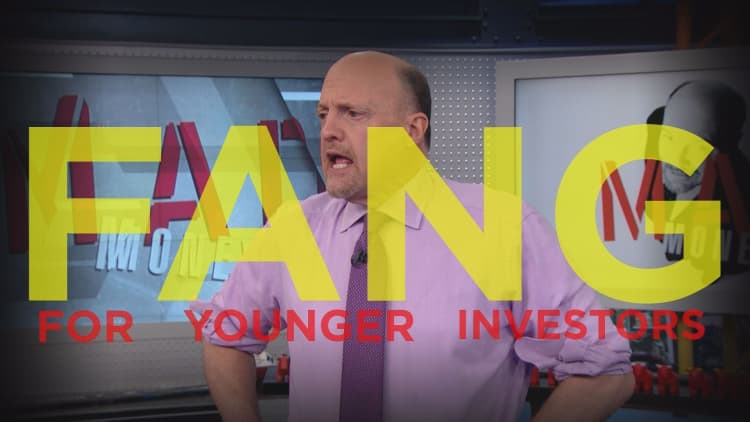
Next week is light for earnings, but Jim Cramer is preparing for the heavy anchor that could drop on Wall Street when payroll numbers are released.
"Next Friday we get the Labor Department's employment statistics, and if the numbers are strong, we are going to get a rate hike when the Fed meets a few weeks from now," the "Mad Money" host said.
Thus, all earnings next week must be viewed through the lens of possible Fed action. If the numbers are strong, Cramer thinks the Fed will pull the trigger on a rate increase at the June meeting. Many Fed members have expressed the need for two or three rate hikes this year. Only a very weak number could change that.
"To say that this one is important is to underestimate the most significant employment report of the year," Cramer said.
Additionally, if the market rallies going into the employment report and the number are weak, Cramer anticipates a sell-off as investors fear that the Fed will raise anyway in a weaker environment. That means the bulls may want a strong number to ease concerns that the Fed will take action when the economy isn't so hot.
Read More Cramer's game plan: All eyes on employment, Fed could pull the trigger
The show "Mad Money" first began as an outgrowth of Cramer's radio show called "Real Money." At that time, people were craving specific investment ideas. Everything changed when investors were hit with the Great Recession, which shifted the way investors viewed the market.
During that time, there were many big companies that were destroyed by the downturn, especially financial companies, along with the dramatic decline in economic activity.
"That era changed things, and it changed me. It changed the show," Cramer said.
The show is no longer about just giving stock ideas, because in Cramer's opinion that is not enough anymore. In fact, he now deliberately has minimized highlighting stock ideas. He would rather an investor be taught to understand the process and be able to pick stocks for themselves.
Read MoreCramer: Why hot stocks don't cut it anymore for your portfolio
"I think this show can play a role in your financial education and get you to the point where you make fewer errors and have more of a chance to make money longer term if you choose to invest in individual stocks as well as index funds," Cramer said.
Cramer learned a very valuable lesson from watching his father lose money on an investment when he was younger. He learned that investors will want to own individual stocks to augment their paycheck, but they must know how to invest in an individual stock if they are going to do so.
That is why he created the following four rules for owning stocks:
No. 1 Tips are for waiters.
No. 2 You must do the homework if you are going to own an individual stock.
No. 3 If you can't do the homework, then own an index fund.
No. 4 If you fear losing money, don't own stocks at all because they will go down as well as up.
Read MoreCramer: Get an upper hand on the market—my 4 rules to owning stocks
When Cramer first graduated college, he worked as a reporter covering sports and government in Tallahassee, Florida, where he made $153 a week. And while he didn't have a lot of money to spare, he did find a way to save in his IRA and began to buy individual stocks for a personal account.
"I was going to do it the right way, by researching stocks and getting an edge through that research," Cramer said.
After losing money on a few investments, Cramer decided to go to the library and research companies. Eventually, he found a company called Natomas, which had just discovered a large find in Indonesia. He took $300 and bought the stock, and it quickly caught a takeover bid.
Cramer realized from his investment in Natomas that by doing the homework, it gave him an edge over others and helped to arm him with the proper knowledge about a stock. He was hooked on stocks and never turned back. Eventually, Cramer made enough money to pay for his first year of law school when he decided to become an attorney.
Read MoreCramer: How stocks paid for me to go to college
And when Cramer decided to leave Goldman Sachs after four years and open his own hedge fund, the first stock that he bought was Heinz. Why? Because he liked to own a stock that represented a call on great management that could deliver earnings through thick and thin.
What he didn't count on were the performance demands of a hedge fund manager. He quickly learned that just buying a stock because it was terrific didn't matter to the fund, and those long-term investments did not produce daily performance.
"Heinz was a staple with a good dividend and what I didn't understand at the time was when the economy heats up people dump these kinds of stocks for something more cyclical," Cramer said.
But here was the problem—this rotation game is not one that investors can play at home without being a full-time professional. And eventually when the market got too hot, it crashed and all of the cyclical plays were decimated.
But guess what? Heinz snapped right back. That is what happens to best-of-breed well-managed companies



